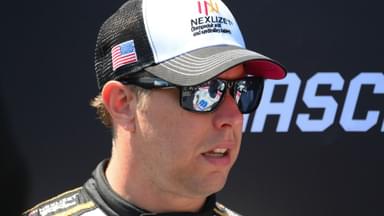For some, NASCAR is on the decline, while for others, it is in the process of retaining its allure and competitive edge. However, one thing is evident, the sport’s viewership has waned since its peak in the late 1990s and early 2000s. The downturn has led to a retreat of sponsors and manufacturers once closely tied to the sport. Brad Keselowski recently discussed this issue, outlining his expectations for the OEMs involved in NASCAR.
Advertisement
Currently, NASCAR collaborates with three OEMs — Chevrolet, Ford, and Toyota. However, Keselowski warns that the departure of even one could jeopardize the sport’s stability. This concern was voiced during a conversation with Kelley Earnhardt Miller, co-owner of JR Motorsports, who inquired about Keselowski’s opinion regarding the potential threats to the sport. He responded, “I would say there’s 1A and 1B that are the two biggest threats for me.”
Elaborating, Keselowski said, “One is whatever falls out of the charter lawsuit, the OEM picture and landscape is a significant threat. NASCAR has been operating with three OEMs now for probably a decade or a decade and a half now, I would say. It’s a bit of a precarious position to be in…”
Discussing the rapidly evolving automotive landscape in Asia, Keselowski noted, “As we’re seeing companies like Tesla take off and take market share, the Asian auto market really take off and take market share from the current NASCAR OEMs.”
The RFK Racing co-owner predicts that these shifts will inevitably influence NASCAR. He suggested that NASCAR needs to evolve towards becoming more OEM agnostic, adapting to a landscape where the role of manufacturers transcends technical involvement and focuses more on marketing and branding collaborations.
What's the biggest threat to NASCAR at the moment? ⚠️
Full Response ➡️ https://t.co/VtC1Flj9rV@EarnhardtKelley | @keselowski pic.twitter.com/8kJdcAFo4N
— Dirty Mo Media (@DirtyMoMedia) January 21, 2025
Fans resonated with Keselowski’s perspective, with one commenting, “Incredible insight. I agree from a business perspective that the limited OEMs and the changes in OEM marketshare are a huge threat. But frankly it’s the entire sponsorship model. This is why I think NASCAR’s handling of the charter system and frankly their entire business is incredibly flawed…”
One admirer praised Keselowski’s intellectual prowess, commenting, “@keselowski is probably the most interesting driver to listen too. Wicked smart.”
Brad knows his stuff. Well said.
— BROskee Wow Wow (@BROskeeWowWow) January 22, 2025
A fan shared his perspective, remarking, “Going to be hard to keep racing OEMs that aren’t building cars that can even be stock cars. Honestly think NASCAR saw this awhile back when they acquired IMSA. Don’t get me wrong I want the sport to make it but it’s going to take some more tweaks and more marketing. Maybe even <gasp> a switch to the hybrid platform.”
Another enthusiast argued for a return to NASCAR’s roots, suggesting more autonomy for the OEMs in vehicle design: “The only way @NASCAR can help the OEM’s is by letting the build the cars/engines to truly out perform the others. Modern day NASCAR does NOTHING for OEMs. It’s just a sports marketing cost for them. They don’t even get to experiment anymore.”
Even during last year’s Martinsville race manipulation controversy, Keselowski did not hold back in criticizing the OEMs for using strategies to manipulate outcomes.
When Keselowski discussed OEM interference in race outcomes
In the 2024 NASCAR Cup season’s penultimate race at Martinsville, the final moments saw Christopher Bell disqualified from playoff contention, nudging William Byron ahead to the final by a slender margin. Amidst this upheaval, Ross Chastain and Austin Dillon were observed protecting Byron from any potential on-track scuffles.
In a parallel scenario, Bubba Wallace seemingly decelerated during the final lap, a maneuver that briefly propelled Bell forward — an action that ignited further controversy over race manipulation. In the aftermath, Dillon, Wallace, and Chastain faced penalties. However, Keselowski pinpointed the manufacturers as the primary instigators behind the scenes.
He contended that NASCAR’s stringent regulations, which curtail practice sessions and limit teams’ ability to meticulously tune their cars, have inadvertently bolstered the sway of car manufacturers (OEMs) in the sport.
“The OEMs have never had more leverage than they have today in this board,” Keselowski remarked, implying that these entities manipulate their clout to dictate team strategies.
This could also be one of the reasons why Keselowski has advocated for manufacturers to pivot their focus toward enhancing their brand marketing rather than delving into the technical intricacies of the sport.




